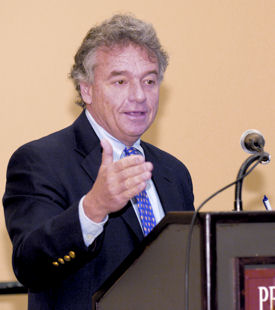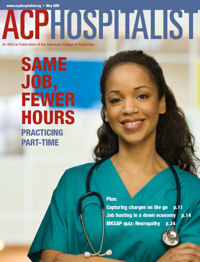Letters to the Editor
Readers tell the College about their fears and hopes for the patient-centered medical home, as others fancifully reimagine how health care could be reconstructed.
Thoughts on the PCMH
Thank you for a well-written and informative article about Pennsylvania's efforts to pilot a Chronic Care Model/patient-centered medical home [“Patients find medical home in Pennsylvania, “ ACP Internist, April 2009]. It's been a tough project given the local issues around the state, but there has been significant commitment by all the stakeholders, including hospital and nurse communities and the insurance and business communities, in addition to the Governor's office and the physicians. As you point out, the key will be the financial sustainability of the model.
Ralph Schmeltz, FACPFormer ACP Governor, Western Pennsylvania
Washington, Pa.
There's an enormous and as yet unacknowledged elephant in the (exam) room of the patient-centered medical home (PCMH) [“Patients find medical home in Pennsylvania, “ ACP Internist, April 2009]. For many years now our leaders of organized medicine continue to repeat the threatening message that primary care is broken, and that at this late date, the PCMH is the only cure, lest the specialty wither and die. After investing 29 years of my career in the same small group internal medicine/primary care practice, I'm not gratified to be told that I am part and parcel of a broken medical specialty. I prefer to believe that it is the system that is broken, not me.
I fear the specialty of internal medicine/primary care may become an irrelevant one. Hospitalists pushed me out of the hospital, nurse practitioners claim they can perform 75% of my duties, “minute clinics” are more than happy to skim my office fees from otherwise healthy patients, and many new recruits to primary care that I interview seem to desire part-time, lifestyle-friendly, heavily accommodated positions that tend to disrupt long-standing, traditional practice styles. All these factors suggest a paradigm change in the historical commitment that internists/primary care physicians have made to their patients. Students are choosing careers with their feet and wallets, and walking actually the numbers suggest running away from primary care careers.
The ranks of primary care physicians continue to age as younger physicians are not replenishing them. Many established primary care physicians are not in a position to change careers, even if they wanted to. It appears medical students and house officers haven't been appropriately queried either about the PCMH as an attractive career; and can marketing primary care be ultimately successful if the incessant message is that it is broken, in need of reinvention, and that the large remuneration gap with other specialties is likely to persist?
Established internists, like myself, are not asked whether we would find it desirable to change to a PCMH, especially those of us with limited resources. It seems attaining even a level one degree PCMH is no easy task. One can't help but feel that the need for the PCMH option implies that we've been failures in our traditional practices all these years.
Worse, if we choose to continue to toil in our traditional practices, there appears to be no hope, or anticipated support from organized medicine to improve our lot. I fear we're being deserted by our leadership if we all don't jump on the PCMH bandwagon. Being a “team leader”; spending a large part of one's day at a computer screen massaging a data base of patients to please an insurer; acquiring more “scut work” chores from specialists, surgeons, visiting nurses and ancillary providers; and prior authorization/formulary “specialists” who believe that the PCMH is now the home address for this type of busy work doesn't seem attractive. I'm having a very hard time imagining my practice evolve into managing a panel of patients without seeing them across my desk, without talking with them, and without physically engaging with them, but instead instructing others on my team to interact with them.
Michael E. Miller, ACP Member
Boston
Focus on the front line
I am a full-service general internist in my 23nd year of practice and the last of five in my original call group. I will always be a fierce loyalist to the doctor-patient relationship until I can no longer afford to be, which by my calculations will come around 2015.
Fine medical journals move from the problem of primary care attrition to the orgasmic unveiling of the answer … the electronic medical record (EMR) and its sidekick, evidence-based medicine (EBM).
What a disappointment! I was hoping for a little more flesh and blood, not microchips in a “holy missile.” EMR and EBM have given everyone a GPS but no car. So now it seems I have to buy a car to go with this, and that brings extra costs to my practice just as a car creates expenses.
Modern medicine has been perverted into an intolerant religion. Those who dare question EMRs and EBMs are decried as heretics, haters, fear mongers, and backward hicks. But, fitting for modern thinking and feel-goodisms, there is always the alternate ending where the internist is rescued with an employment contract or anointed a disciple of modern medical science. I will pass, as I am too old and irrevocably influenced by fine mentors long since gone.
Today I heard from a patient of mine whom I had referred to a specialist. He lamented about the encounter with the laptop-wielding physician, “You know, doctors sure don't type fast, that's for sure. It ate up my entire five minute visit with him!” It was then I realized that was precisely the point. That is what bothers me about this new religion.
Michael K. Crawford, ACP Member
Oklahoma City, Okla.
Re-imagining health care
Imagine you are in department store. You aren't supposed to ask the price and are buying all things almost of your choice. You don't have to pay. The store keeper is happy to provide you more than you want because he can bill more if he sells more.
This is the majority situation of today's health care system. The customer is a patient; the storekeeper is doctor/hospital/health care provider. The store owner is Medicare.
Would you be surprised if store owner gets bankrupted?
Currently we are trying to regulate and punish the storekeeper (health care provider), but patients spend all this money, many times irresponsibly, without rules or regulations to follow. On the contrary, if the patient gets less, he or she threatens to sue.
Think about if the all services related to health care were paid by debit card. This would reduce administrative cost, and any savings could be applied to the patient's Social Security account. The customer would be rewarded for saving money.
This may not be the perfect solution for our health care system.
We are spending $1 billion a day. It would not hurt to do a trial on a thousand patients to see if we can save some money before the health care system drowns all of us.
Sharad Swami, FACP
Clinton, Okla.
PSA tests reconsidered
William C. Waters III, MACP, objects [Letters to the Editor, ACP Internist, May 2009] to any conclusions being drawn about PSAs from the two recently published studies on seven-plus years of follow-up of screening PSA that show no proven benefit of this test used to improve income of urologists and radiotherapists over the last 22 years without any demonstrated longevity benefit as yet.
An Annals of Internal Medicine editorial in the May 5 issue again notes that, “Within 10 years of trial entry, screening increases the number of cancer cases diagnosed but has no effect on cause-specific mortality” and repeats what the articles make clear: “Thus, the two screening trial reports are interim accounts and are not definitive.”
Recently, clinical guidelines have stated that men over 75 should not have PSA screening and, for younger men, there is as yet no evidence that benefits of testing outweigh the harms.
Nevertheless, Dr. Waters states that “There are hundreds of other studies, several showing significant benefit in therapy of localized disease.” Really? Where? I suspect that this is another anecdotal report of benefit, as with the politicians (one of whom ran in presidential primaries), baseball managers, and other celebrities who have been abused by overzealous therapies and like to pronounce themselves as “cancer survivors” who have “beaten prostate cancer.”
Lonnie Hanauer, FACP
Millburn, N.J.




